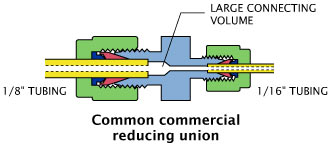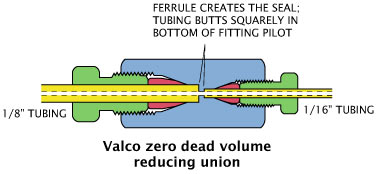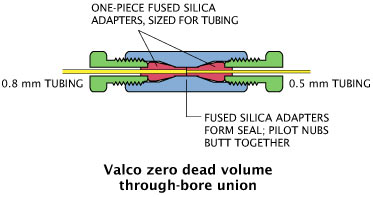Comparison of compression fitting designs
The potential for dead volume and mixing is a consideration in several aspects fitting design, and varies considerably among manufacturers. For example, the common gas distribution reducing union shown below illustrates two problems for instrumentation: a large connecting volume, and various steps and restrictions which cause mixing. While there are many uses for these fittings upstream of the analytical system (such as bulk gas distribution), they cause problems when used downstream in critical applications.

Additional difficulties may be encountered if this type of fitting is loosened and retightened repeatedly. The male threaded part can become flared to the point where it is impossible to get the nut on, and the tube end often flares out in the fitting detail so that it's difficult to remove the tube.
The Valco internal union shown below has a larger mass surrounding the ferrule, so that even with repeated remakes or overtightening, it's impossible to flare the fitting as in the external design. When a union is selected with a bore to match the ID of the connecting tubing, mixing and dead volume are virtually eliminated.

For connection of fused silica tubing of the same or differing sizes, the through-bore union below is recommended. This fitting permits the use of our one-piece fused silica adapters to effect a true zero dead volume connection. The ferrule features an integrated pilot which adapts to the ID of the unions, resulting in an inert, zero volume connection.

Every Valco and Cheminert fitting is manufactured to exacting specifications. Fitting concentricity - the relationship of the center of one fitting to another - is held to within 10% of the bore size (0.05 mm in a typical 1/16" union with 0.5 mm bore), which is better than that of commonly used tubing. This results in fittings which contribute no "extra column effects" or loss of efficiency to the chromatographic system.




